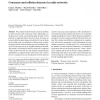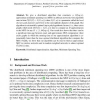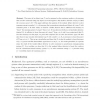130
Voted
DC
2008
15 years 2 months ago
2008
Fast algorithms are presented for performing computations in a probabilistic population model. This is a variant of the standard population protocol model--in which finite-state ag...
131
Voted
DC
2008
15 years 2 months ago
2008
We study the feasibility and cost of implementing --a fundamental failure detector at the core of many algorithms--in systems with weak reliability and synchrony assumptions. Intui...
92
Voted
DC
2008
15 years 2 months ago
2008
This study addresses the construction of a preset checking sequence that will not pose controllability (synchronization) and observability (undetectable output shift) problems whe...
109
Voted
DC
2008
15 years 2 months ago
2008
150
Voted
DC
2008
15 years 2 months ago
2008
We consider a distributed system where each node keeps a local count for items (similar to elections where nodes are ballot boxes and items are candidates). A top-k query in such ...
101
click to vote
DC
2008
15 years 2 months ago
2008
This paper introduces solo-valency, a variation on the valency proof technique originated by Fischer, Lynch, and Paterson. The new technique focuses on critical events that influe...
93
Voted
DC
2008
15 years 2 months ago
2008
123
click to vote
DC
2008
15 years 2 months ago
2008
This paper determines necessary and sufficient conditions to implement wait-free and non-blocking contention managers in a shared memory system. The necessary conditions hold even...
102
click to vote
DC
2008
15 years 2 months ago
2008
The power of an object type T can be measured as the maximum number n of processes that can solve consensus using only objects of T and registers. This number, denoted cons(T), is ...



